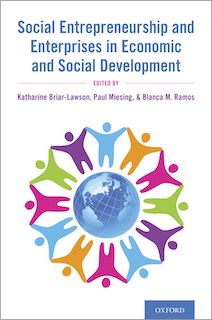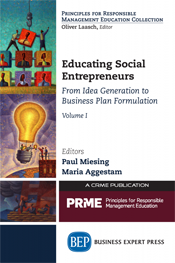Creating social impact through expertise
Paul Miesing is the founding director for The Center for the Advancement & Understanding of Social Enterprises (CAUSE) in the Massry School of Business at the University at Albany where he teaches and conducts research in strategic management including the following:
- Executive leadership
- Corporate boards and governance
- Organizational learning and transformation
- Technology transfer
- International business and globalization
- Cross-culture management and organization
- Corporate social responsibility and business ethics
Paul has published dozens of articles and papers in academic and practitioner journals, and helped many audiences, including companies, civic groups, industry associations and government agencies, locally and internationally. He is joined by Standish Professor of Entrepreneurship Bill Wales, who serves as the vice chair of CAUSE. Learn more about CAUSE's social enterprise scholarship below.

Publications
J.M. Perry, P. Miesing, & J.M. Jurkowski (2020). "Food Deserts: Insecurity as a Major Social and Environmental Determinant of Health and Well-Being" Palgrave Encyclopedia of Interest Groups, Lobbying and Public Affairs.
P. Miesing, (2019). "Introduction to the Special Issue on Food Deserts and Security" Journal of Public Affairs 19 (3).
T. Onishi, A. Burkemper, E. Micelotta, & W.J. Wales (2018). “An Effectual Perspective on How Social Entrepreneurs Select, Combine, and Orchestrate Resources” Winner of the Entrepreneurship Division’s Best Social Entrepreneurship Paper Award. AOM Annual Meeting Proceedings.
J. Lee & P. Miesing (2017). "How Entrepreneurs Can Benefit from Failure Management" Organizational Dynamics 46: 157-164 summarized at UAlbany News Center, Ladders, and BizEd.
P. Goldschein & P. Miesing (2016). "How Benefit Corporations Effectively Enhance Corporate Responsibility" Business & Professional Ethics Journal 35 (2-3): 109-128 was in response to a call for papers on “Benefit Corporations: Ethics and Efficacy of a New Corporate Form” of business incorporation that specifically requires companies to integrate the competing tensions of profits and principles in business which is a foundation for CAUSE.
A. Shahzad, W.J. Wales, M. Sharfman, & C. Stein (2016). "Casting a Wider Performance Net: The Role of Entrepreneurial Orientation in Boosting Overall Firm Stakeholder Value" Journal of Management & Organization, Vol 22, pp. 272-290.
S. Goel, P. Miesing, & U. Chandra (2010). "The Impact of Illegal Peer-to-Peer File-Sharing on the Media Industry" California Management Review, 52 (3): 6-33 [ranked among the Top 5 most frequently downloaded 2013].
L. Easterly & P. Miesing (2009). "NGOs, Social Venturing, and Community Citizenship Behavior" Business & Society 48 (4): 538-564.
J. Hua, P. Miesing, & M. Li (2006). "An Empirical Taxonomy of SOE Governance in Transitional China" Journal of Management and Governance 10: 401-433.
L. Larwood, C.M. Falbe, M.P. Kriger, & P. Miesing (1995). "Structure and Meaning of Organizational Vision" Academy of Management Journal 38: 740-769.
T.C. Dandridge & P. Miesing (1990). "Underlying Patterns in a Current Economic Development Model" Policy Sciences 23: 231-240.
P. Miesing & J.F. Preble (1985). "A Comparison of Five Business Philosophies" Journal of Business Ethics 4: 465-476.
Books
K. Briar-Lawson, P. Miesing, & B. Ramos (eds.), Social Entrepreneurship and Enterprises in Economic and Social Development (Oxford University Press, 2020).

Since 2015, micro-lending programs for low-income microentrepreneurs have become a global priority. Inspired to create their own microlending program, the School of Social Welfare and the Massry School of Business at the University of at Albany were aided by the university’s Small Business Development Center and the State Employees Federal Credit Union, which led to the creation of the Small Enterprise Economic Development (SEED) program. Following this, new faculty were hired to address social entrepreneurship and lead these initiatives. The impetus for this book emerged from these developments including three forums in which national and international contributors participated in workshops, panels, and chapters for this book. These forums were co-organized by the School of Social Welfare, the Massry School of Business, and a new Center for the Advancement & Understanding of Social Enterprises (CAUSE) at UAlbany.
Building on the example set by UAlbany, Social Entrepreneurship and Enterprises in Economic and Social Development, explains how and why we should integrate social entrepreneurship and social enterprises with social and economic development. While this global movement varies in pace and scope, the volume features snapshots from countries and regions representing nearly all continents, including Albania, Argentina, Cuba, India, Kenya, Kyrgyzstan, Russian Federation, Taiwan, Tajikistan, and Tanzania.
One of the lessons is that social policies are critical for supporting social entrepreneurs since environmental, economic, and social sustainability are core goals of these initiatives. The chapters in this volume offer different contextual frames ranging from social enterprise business plans and measured entrepreneurial orientation to displacement dynamics (and how to avoid them) and the pitfalls of non-market economies. The contributing authors examine a variety of ventures and social policies to showcase how nations are supporting social enterprises as they attempt to meet human needs and achieve financial sustainability. The resulting volume provides a rationale for, and snapshots of, social enterprises and entrepreneurship in transitioning nations.

P. Miesing & M. Aggestam (eds.), Educating Social Entrepreneurs: From Idea Generation to Business Plan Formulation Vols. I & II (Business Expert Press as part of the United Nations Principles for Responsible Management Education Book Collection, 2017).
Book Chapters
P. Miesing. "Social Enterprises as Integrative Resources, Strategies, and Models" Chapter 1 in K. Briar-Lawson, P. Miesing, & B. Ramos (eds.), Social Entrepreneurship and Enterprises in Economic and Social Development (Oxford University Press, 2020).
W.J. Wales & V.K. Gupta. “Organizational Entrepreneurial Orientation: Implications for Social Impact and Social Enterprise” Chapter 3 in K. Briar-Lawson, P. Miesing, & B. Ramos (eds.), Social Entrepreneurship and Enterprises in Economic and Social Development (Oxford University Press, 2020).
W.J. Wales & C. Stein. “I Think Therefore I Am … Social Entrepreneurial Identity and Network Development” Chapter 2 in P. Miesing, Educating Social Entrepreneurs: From Idea Generation to Business Plan Formulation Vol. I (Business Expert Press as part of the United Nations Principles for Responsible Management Education Book Collection, 2017).
P. Miesing, L. Krzykowski, & E. Rich. "Enabling Sustainability in Management Education" Chapter 22 in J.A. Arevalo and S.F. Mitchell (eds.), Handbook of Sustainability in Management Education: In Search of a Multidisciplinary, Innovative and Integrated Approach (Cheltenham, UK & Northampton, MA. US: Edward Elgar Publishing, 2017).
P. Miesing, B. Watts, D. Siegel, & K. Briar-Lawson. "Lessons on Microenterprise Development from a University-Based Microlending Development Program" Chapter 23 in D.B. Audretsch, A.N. Link, & M. Walshok (eds.), Oxford Handbook of Local Competitiveness (Oxford Handbooks in Business and Management, 2015).
L. Easterly & P. Miesing. (eds.) "Social Venture Business Strategies for Reducing Poverty" Chapter 1 in Innovative Approaches to Reducing Global Poverty, in J.A.F. Stoner and C. Wankel (Information Age Publishing, 2007).
Pedagogy
P. Miesing & R. Van Ness (2020). Exercise: Is ‘ESG’ a Competitive Advantage?, Eastern Academy of Management.
P. Miesing & E.J. Pavur (2008). Exercise: Stakeholder Negotiations, Journal of Strategic Management Education, Vol 4.
P. Miesing & R.K. Van Ness (2007). Exercise: Scenario Planning, Organization Management Journal, Vol. 4(2): 148-167.
Independent Study/Research Theses
Miyuki (Sumi) Maloney, How can Corporate Social Responsibility Make a Company be a More Desirable Place to Work While Also Benefiting the Local Community? Establishing an area focused CSR strategy in the New York Capital Region to be competitive in the semiconductor job market” asks several questions. What do job seekers expect from a company besides salary, benefits, and job content? What kinds of public relations can provide a positive impression for job seekers? What type of company culture can add value to decision-making? The purpose of this research is to seek a way to utilize Corporate Social Responsibility (CSR) as a tool to add competitive value to business operations, especially in acquiring and retaining competent employees, 2017.
Robert Caserta, A New Approach in Bringing Legal Representation to All: Using Social Enterprise Business Models to Close the Gap in the Access to Justice, Spring 2016.
Omayra L. Padilla De Jesús, Beyond STEM: Program Design for Effective and Sustainable Social Impact, Spring 2016.
In the news
Grants
2020: Co-PI: $7,500 SUNY research seed grant for “Food systems in crisis: Dynamic local foodsheds as safety nets” Proposal #COVID202114.
2017: Participated in obtaining ReserveAid $500,000 scholarship endowment to allow the veteran recipients to graduate from the University at Albany without student debt.
2013-2017: Co-PI: Confucius Institute – Southwest University of Finance and Economics (Chengdu, China) provided $150,000 in start-up funds (2013-2014) and $60,000 operations (2014-2015), with approximately $47,000 carry-over budget to cover 2016-2017.
2010-2012: Co-PI: $96,653 grant for each year from Empire State Development Corp.’s Urban and Community Development Program for “Promoting Economic Development Through Social Entrepreneurship.


